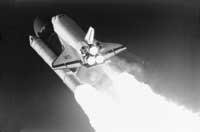New method of energy production in space

We have commented on several occasions that vehicles and other devices of space consume a lot of energy. Rechargeable batteries are used to meet this energy demand. However, these batteries are usually large, heavy and often unuseful. To overcome this problem, Professor Shripad Revankar, who teaches nuclear engineering at Purdue University in the US a new method of energy production in space.
The base of the system is a material that is liquid at high temperature and freezes at low temperature. During the hours of sun exposure, part of the apparatus of space can reach 800ºC, at high temperatures the material is kept liquid. When entering the space on the dark side of the orbit, however, the temperature decreases and the material solidifies. The heat released during this freezing process can be used to produce electricity, either by turbines or by mechanisms called thermoelectric units. According to the inventor, this new system will be smaller than is currently used, and more energy can be accumulated. On the other hand, the experiments to be carried out to test the system can be carried out on Earth much faster and, above all, more economical.





